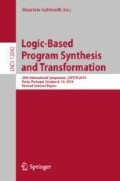Abstract
We study partial and total correctness proof methods based on generalized fixpoint/iteration/variant induction principles applied to the denotational semantics of first-order functional and iterative programs.
Access this chapter
Tax calculation will be finalised at checkout
Purchases are for personal use only
Notes
- 1.
Notice that with our choice of \(\mathcal {Q}\), this is not necessarily true for chains that are not \(F_{\texttt {W}}\)-iterations.
References
Apt, K.R., Plotkin, G.D.: Countable nondeterminism and random assignment. J. ACM 33(4), 724–767 (1986)
de Bakker, J.W., Scott, D.S.: A theory of programs. IBM Seminar Vienna, Austria, August 1969. Unpublished notes
Burstall, R.M.: Program proving as hand simulation with a little induction. In: IFIP Congress, pp. 308–312. North-Holland (1974)
Clarke Jr., E.M.: Programming language constructs for which it is impossible to obtain good Hoare axiom systems. J. ACM 26(1), 129–147 (1979)
Cook, S.A.: Soundness and completeness of an axiom system for program verification. SIAM J. Comput. 7(1), 70–90 (1978)
Cook, S.A.: Corrigendum: soundness and completeness of an axiom system for program verification. SIAM J. Comput. 10(3), 612 (1981)
Cousot, P.: Méthodes itératives de construction et d’approximation de points fixes d’opérateurs monotones sur un treillis, analyse sémantique de programmes. Thèse d’État ès sciences mathématiques, Université de Grenoble Alpes, Grenoble, France, 21 March 1978. (in French)
Cousot, P., Cousot, R.: Constructive versions of Tarski’s fixed point theorems. Pac. J. Math. 82(1), 43–57 (1979)
Cousot, P., Cousot, R.: Induction principles for proving invariance properties of programs. In: Néel, D. (ed.) Tools & Notions for Program Construction: An Advanced Course, pp. 75–119. Cambridge University Press, Cambridge (1982)
Cousot, P., Cousot, R.: “A la burstall” intermittent assertions induction principles for proving inevitable ability properties of programs. Theor. Comput. Sci. 120(1), 123–155 (1993)
Damm, W., Josko, B.: A sound and relatively * complete Hoare-logic for a language with higher type procedures. Acta Inf. 20, 59–101 (1983). https://doi.org/10.1007/BF00264295
Floyd, R.W.: Assigning meaning to programs. In: Schwartz, J. (ed.) Proceedings of a Symposium in Applied Mathematics, vol. 19, pp. 19–32. American Mathematical Society (1967)
Heizmann, M., Jones, N.D., Podelski, A.: Size-change termination and transition invariants. In: Cousot, R., Martel, M. (eds.) SAS 2010. LNCS, vol. 6337, pp. 22–50. Springer, Heidelberg (2010). https://doi.org/10.1007/978-3-642-15769-1_4
Hoare, C.A.R.: An axiomatic basis for computer programming. Commun. ACM 12(10), 576–580 (1969). http://doi.acm.org/10.1145/363235.363259
Katz, S., Manna, Z.: A closer look at termination. Acta Inf. 5, 333–352 (1975). https://doi.org/10.1007/BF00264565
Kleene, S.C.: Introduction to Meta-Mathematics. Elsevier North-Holland Pub. Co., Amsterdam (1952)
Lee, C.S., Jones, N.D., Ben-Amram, A.M.: The size-change principle for program termination. In: POPL, pp. 81–92. ACM (2001)
Leroy, X., Doligez, D., Frisch, A., Garrigue, J., Rémy, D., Vouillon, J.: The OCaml system, release 4.08, Documentation and user’s manual, February 2019. http://caml.inria.fr/pub/docs/manual-ocaml/, copyright \(\copyright \) 2013 Institut National de Recherche en Informatique et en Automatique
Manna, Z., Ness, S., Vuillemin, J.: Inductive methods for proving properties of programs. Commun. ACM 16(8), 491–502 (1973)
Manna, Z., Pnueli, A.: Axiomatic approach to total correctness of programs. Acta Inf. 3, 243–263 (1974). https://doi.org/10.1007/BF00288637
Manna, Z., Vuillemin, J.: Fix point approach to the theory of computation. Commun. ACM 15(7), 528–536 (1972)
Markowsky, G.: Chain-complete posets and directed sets with applications. Algebra Univ. 6(1), 53–68 (1976)
Park, D.: On the semantics of fair parallelism. In: Bjøorner, D. (ed.) Abstract Software Specifications. LNCS, vol. 86, pp. 504–526. Springer, Heidelberg (1980). https://doi.org/10.1007/3-540-10007-5_47
Régis-Gianas, Y., Pottier, F.: A Hoare logic for call-by-value functional programs. In: Audebaud, P., Paulin-Mohring, C. (eds.) MPC 2008. LNCS, vol. 5133, pp. 305–335. Springer, Heidelberg (2008). https://doi.org/10.1007/978-3-540-70594-9_17
Schmidt, D.W.: Denotational Semantics: A Methodology for Language Development. William C. Brown Publishers, Dubuque (1988). http://people.cs.ksu.edu/~schmidt/text/DenSem-full-book.pdf
Scott, D.S.: Outline of a mathematical theory of computation. In: Proceedings of the Fourth Annual Princeton Conference on Information Sciences and Systems, pp. 169–176. Princeton University, March 1970
Scott, D.: The lattice of flow diagrams. In: Engeler, E. (ed.) Symposium on Semantics of Algorithmic Languages. LNM, vol. 188, pp. 311–366. Springer, Heidelberg (1971). https://doi.org/10.1007/BFb0059703
Tarski, A.: A lattice theoretical fixpoint theorem and its applications. Pac. J. Math. 5, 285–310 (1955)
Turing, A.: Checking a large routine. In: Report of a Conference on High Speed Automatic Calculating Machines, University of Cambridge Mathematical Laboratory, Cambridge, England, pp. 67–69 (1949). http://www.turingarchive.org/browse.php/b/8
Acknowledgements
I thank Francesco Ranzato for comments and suggestions on earlier versions of the paper. Work supported in part by NSF Grant CCF-1617717.
Author information
Authors and Affiliations
Corresponding author
Editor information
Editors and Affiliations
Rights and permissions
Copyright information
© 2020 Springer Nature Switzerland AG
About this paper
Cite this paper
Cousot, P. (2020). On Fixpoint/Iteration/Variant Induction Principles for Proving Total Correctness of Programs with Denotational Semantics. In: Gabbrielli, M. (eds) Logic-Based Program Synthesis and Transformation. LOPSTR 2019. Lecture Notes in Computer Science(), vol 12042. Springer, Cham. https://doi.org/10.1007/978-3-030-45260-5_1
Download citation
DOI: https://doi.org/10.1007/978-3-030-45260-5_1
Published:
Publisher Name: Springer, Cham
Print ISBN: 978-3-030-45259-9
Online ISBN: 978-3-030-45260-5
eBook Packages: Computer ScienceComputer Science (R0)

